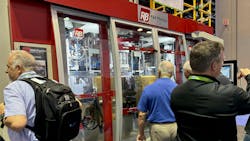More on the economy
Read the full report on the plastics machinery market here.
By Ron Shinn
Economists and forecasters and pundits all have takes on how the economy is doing today and predictions on what it will do tomorrow.
While this can be useful, my experience is that if you really want to know which way the economic winds are blowing in the plastics industry, ask a machinery salesman. Good ones listen closely to their customers, who in turn are dealing directly with OEMs and others who are selling the things processors make.
Machinery and equipment sellers also study the market differently from economists. One major auxiliary equipment maker told me recently that despite conventional wisdom that business slows down before a presidential election as cautious consumers wait to see who wins, a study of sales records around the past two elections shows that is not true for his business.
Three Plastics Machinery & Manufacturing staffers asked machinery company representatives at NPE2024 a set of questions about their current and anticipated business. Notwithstanding the optimism expected in an environment where companies are touting their latest bells and whistles, they had plenty to say about the economy. Here are a few highlights from the full report.
“If you look at the statistics published by the Plastics Industry Association, clearly all machinery manufacturers … [were] negatively impacted, unfortunately,” said Steve London, who, as Bekum America Corp. president and COO, served as chairman of NPE2024. “We are seeing some recovery. We are seeing a lot of end users who are taking [lessons from] the supply chain crisis and becoming producers of containers when they didn’t do that before.”
Gary Sowden, VP of Kiefel Packaging Division at Brueckner Group USA, said high interest rates and environmental issues with plastics were hurting his business.
“I’ve been in this business for 40 years now, and this is a really unique set of circumstances that I don’t think we’ve ever seen before,” Sowden said.
Guido Frohnhaus, managing director of technology and engineering for Arburg GmbH + Co., said revenue declined 11 percent in 2023 and first-quarter orders this year were lower than a year earlier.
“Unfortunately, there is no sign of significant improvement in the short term,” Frohnhaus said.
The Arburg executive was one of several mentioning the stops and starts of the automotive industry as causing problems for the plastics industry. Frohnhaus mentioned the uncertainty of the auto industry’s transition to electric vehicles as an example.
Ryan Pysarchik, president of Gluco Multiplas, said, “They’re hanging on a thread, and we’re hanging on their thread.”
Stefan Engleder, CEO of the Engel Group, said his company’s global sales were down about 6 percent, “This is actually not too bad,” he said.
Michael Wittmann, president of the Wittmann Group, said, “The last couple of years actually have been quite troublesome for us. And this year we are seeing a little bit of a drop.”
Several executives complained about high inflation rates.
“We had many years with almost zero interest,” said Karl Stöger, CEO of extrusion technology manufacturer SML. “People were used to that, and money is for free. If I need $5 million as a loan, I can get it and hardly pay any interest. So this, of course, helps investment decisions. So, then, when suddenly within a couple of months, it was raised from zero to 5 percent in the U.S. and 4 percent in Europe, of course this was not helping investment decisions. I have to recalculate. Is this project still viable economically?”
Fred Piercy, president and GM of R&B Plastics Machinery LLC, agreed with Stöger. “Yeah, the capital is tight, interest rates high. …” he said. “I’m surprised it’s not more depressed than it is, to be quite honest.”
Machinery suppliers are betting on the North American market.
Wittmann said the U.S. has surpassed Germany as his company’s biggest market.
Engel is preparing to open its 10th and newest production facility, in Queretaro, Mexico. Engel also has increased its workforce by more than 50 employees, leading to a highest-ever number of more than 260 employees in the U.S. and Canada.
“Let’s hope that the market needs this additional capacity soon,” Engleder said.
Martin Baumann, president and CEO of Arburg Inc., said, “Our customers in the USA and [the] Americas are, for the most part, running machines at reasonable capacity utilization.”
South Korean manufacturer LS Mtron has set an ambitious goal to achieve 20 percent market share in the U.S, and is opening a new technical center in Palestine, Texas, that could become a production facility as sales pick up. The company estimates its current market share at 7.5 percent.
What about a recovery?
Gluco’s Pysarchik said he believes the industry has already hit a turning point. Piercy at R&B Plastics said he believes there is now a pent-up demand. Marko Koorneef, president of Boy Machines Inc., said, “I’m starting to see a light at the end of the tunnel. It seems to me actually in the last month and a half, two months, it’s starting to pick up.”
Ron Shinn, editor
About the Author
Ron Shinn
Editor
Editor Ron Shinn is a co-founder of Plastics Machinery & Manufacturing and has been covering the plastics industry for more than 35 years. He leads the editorial team, directs coverage and sets the editorial calendar. He also writes features, including the Talking Points column and On the Factory Floor, and covers recycling and sustainability for PMM and Plastics Recycling.
